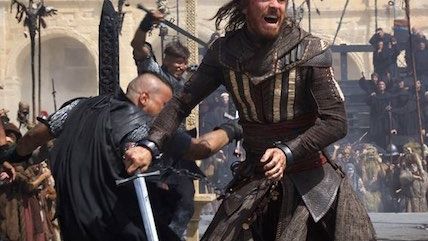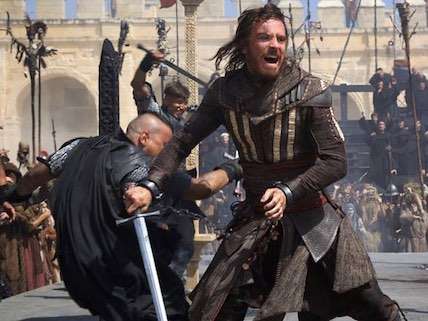Movie Review: Assassin's Creed
Michael Fassbender and Marion Cotillard in another terrible video-game flick.


Assassin's Creed is a movie of sprawling awfulness, and you might initially to wonder why. The story, a gaudy concoction of time-travel exotica derived from a long-popular video game, would seem to have strong sci-fi-fantasy potential; and the expensive cast includes two Oscar-winners and two Oscar nominees. So what went wrong?
Everything. The movie is incoherent both narratively and visually—not a winning combination. After some introductory silliness about the Spanish Inquisition circa 1492, and an Islamic sect called the Assassins (Burroughs alert!), and a search by the Christian Knights Templar for a mysterious Apple of Eden ("The Apple is everything!" they seem to feel), we are suddenly winged away to 1986 Baja California. Here we see a kid coming home to find his mother dead. He notices a monk-like man in a medieval-style cloak standing by a window. "Dad?" he says.
Cut. Thirty years later, the kid—Cal Lynch, his name is—has grown up to become a frequently shirtless Michael Fassbender, and he's about to be executed for murdering somebody. The needle is jabbed home, but Cal doesn't die. Instead, he wakes up in a sleek medical suite where a glum woman named Sofia (Marion Cotillard) welcomes him to Abstergo Industries, which is run by her father, Rikkin (Jeremy Irons). Abstergo is a modern-day front for the Knights Templar, who are now more intent than ever on finding the Apple of Eden, which they believe will provide a cure for violence. "The Apple is within our grasp," says Sofia. "I have to report to the Elders," says Rikkin. "What the fuck is goin' on?" Cal wonders.
Since the Apple is still stuck in the 15th century, Cal has been selected to be hurled back there by a formidable dude-hurling machine called an Animus. Upon arrival, he will be inhabiting the body of his ancestor Aguilar de Nerha, an Assassin warrior who does a lot of running around and roof-jumping, and who might have a line on the Apple. The Assassins believe the Apple contains "the genetic code for free will," something of which the Knights Templar appear to disapprove. I've just wasted precious seconds of your time even mentioning this nonsense.
Director Justin Kurzel, who also teamed Fassbender and Cotillard in last year's bloody rendition of Macbeth, has doubled down on this story's inscrutability by shooting much of the movie through a bronzy scrim of smoke and haze, not always for any good reason. He also leaps back and forth between time frames in a way that ensures maximum annoyance. And he naturally has to take the fall for the movie's clunky pace, as well.
Kurzell's writers might have had a slightly more instructive entertainment in mind: among the historical figures they march through the picture's proceedings are Spanish monarchs Ferdinand and Isabella and the Grand Inquisitor Torquemada. But the insertion of these characters is pointless embroidery on the movie's rampant plot confusion. especially when we're already puzzled enough by the mini-casting of Charlotte Rampling as some sort of Templar bigwig, and an out-of-nowhere appearance by Brendan Gleeson as Cal/Aguilar's long-lost dad.
January is the traditional release graveyard for movies like this—movies being frankly abandoned to box-office defeat. Who thought we shouldn't have to wait for this one?


Show Comments (32)